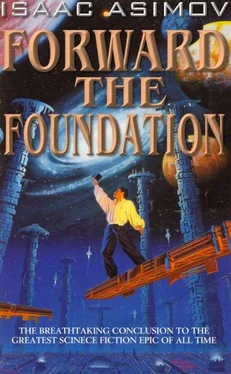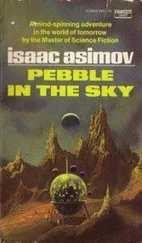“I didn’t exactly—”
“Of course you did. The military rascals who now run the Empire would have slaughtered her if you didn’t step in and sell them your resignation and your support in order to save her.”
“Though I may have evened the score, which I don’t think I have, Raych has not. And, Dors dear, I would be very careful when it came to using unfortunate terms to describe our government. These times are not going to be as easy as the times when Cleon ruled and there will always be informers to repeat what they hear you say.”
“Never mind that. I don’t like that woman. I presume that, at least, is permissible.”
“Permissible, certainly, but of no use.”
Hari looked down at the floor, deep in thought. Dors’s usually unfathomable black eyes were positively flashing in anger. Hari looked up.
“What I’d like to know, Dors, is why ? Why do you dislike Manella so? She saved our lives. If it had not been for her quick action, both Raych and I would be dead.”
Dors snapped back, “Yes, Hari. I know that better than anyone. And if she had not been there, I would not have been able to do a thing to prevent your murder. I suppose you think I should be grateful. But every time I look at that woman, I am reminded of my failure. I know these feelings are not truly rational—and that is something I can’t explain. So do not ask me to like her, Hari. I cannot.”
But the next day even Dors had to back down when the doctor said, “Your son wishes to see a woman named Manella.”
“He’s in no condition to see visitors,” snapped Dors.
“On the contrary. He is. He’s doing quite well. Besides, he insists and is doing so most strenuously. I don’t know that we’d be wise to refuse him.”
So they brought in Manella and Raych greeted her effusively and with the first faint sign of happiness since he had arrived at the hospital.
He made an unmistakable small gesture of dismissal at Dors. Lips tightened, she left.
And the day came when Raych said, “She’ll have me, Mom.”
Dors said, “Do you expect me to be surprised, you foolish man? Of course she’ll have you. You’re her only chance, now that she’s been disgraced, ousted from the security establishment . . .”
Raych said, “Mom, if you’re trying to lose me, this is exactly the way of doing it. Don’t say things like that.”
“I’m only thinking of your welfare.”
“I’ll think of my own good, thank you. I’m no one’s ticket to respectability—if you’ll stop to think of it. I’m not exactly handsome. I’m short. Dad isn’t First Minister anymore and I talk solid lower-class. What’s there for her to be proud of in me? She can do a lot better, but she wants me. And let me tell you, I want her.”
“But you know what she is.”
“Of course I know what she is. She’s a woman who loves me. She’s the woman I love. That’s what she is.”
“And before you fell in love with her, what was she? You know some of what she had to do while undercover in Wye— you were one of her ‘assignments.’ How many others were there? Are you able to live with her past? With what she did in the name of duty? Now you can afford to be idealistic. But someday you will have your first quarrel with her—or your second or your nineteenth—and you’ll break down and say, ‘You wh——!’ ”
Raych shouted angrily, “Don’t say that! When we fight, I’ll call her unreasonable, irrational, nagging, whining, inconsiderate—a million adjectives that will fit the situation. And she’ll have words for me. But they’ll all be sensible words that can be withdrawn when the fight is over.”
“You think so—but just wait till it happens.”
Raych had turned white. He said, “Mother, you’ve been with Father now for almost twenty years. Father is a hard man to disagree with, but there have been times when you two have argued. I’ve heard you. In all those twenty years, has he ever called you by any name that would in any way compromise your role as human being? For that matter, have I done so? Can you conceive of me doing so now—no matter how angry I get?”
Dors struggled. Her face did not show emotion in quite the same way that Raych’s did or Seldon’s would, but it was clear that she was momentarily incapable of speech.
“In fact,” said Raych, pushing his advantage (and feeling horrible at doing so) “the fact of the matter is that you are jealous because Manella saved Dad’s life. You don’t want anyone to do that but you. Well, you had no chance to do so. Would you prefer it if Manella had not shot Andorin—if Dad had died ? And me, too?”
Dors said in a choked voice, “He insisted on going out to meet the gardeners alone. He would not allow me to come.”
“But that wasn’t Manella’s fault.”
“Is that why you want to marry her? Gratitude?”
“No. Love.”
And so it was, but Manella said to Raych after the ceremony, “Your mother may have attended the wedding because you insisted, Raych, but she looked like one of those thunderclouds they sometimes send sailing under the dome.”
Raych laughed. “She doesn’t have the face to be a thundercloud. You’re just imagining it.”
“Not at all. How will we ever get her to give us a chance?”
“We’ll just be patient. She’ll get over it.”
But Dors Venabili didn’t.
Two years after the wedding, Wanda was born. Dors’s attitude toward the child was all Raych and Manella could have wanted, but Wanda’s mother remained “that woman” to Raych’s mother.
Hari Seldon was fighting off melancholy. He was lectured in turn by Dors, by Raych, by Yugo, and by Manella. All united to tell him that sixty was not old.
They simply did not understand. He had been thirty when the first hint of psychohistory had come to him, thirty-two when he delivered his famous lecture at the Decennial Convention, following which everything seemed to happen to him at once. After his brief interview with Cleon, he had fled across Trantor and met Demerzel, Dors, Yugo, and Raych, to say nothing of the people of Mycogen, of Dahl, and of Wye.
He was forty when he became First Minister and fifty when he had relinquished the post. Now he was sixty.
He had spent thirty years on psychohistory. How many more years would he require? How many more years would he live? Would he die with the Psychohistory Project unfinished after all?
It was not the dying that bothered him, he told himself. It was the matter of leaving the Psychohistory Project unfinished.
He went to see Yugo Amaryl. In recent years they had somehow drifted apart, as the Psychohistory Project had steadily increased in size. In the first years at Streeling, it had merely been Seldon and Amaryl working together—no one else. Now—
Amaryl was nearly fifty—not exactly a young man—and he had somehow lost his spark. In all these years, he had developed no interest in anything but psychohistory: no woman, no companion, no hobby, no subsidiary activity.
Amaryl blinked at Seldon, who couldn’t help but note the changes in the man’s appearance. Part of it may have been because Yugo had had to have his eyes reconstructed. He saw perfectly well, but there was an unnatural look about them and he tended to blink slowly. It made him appear sleepy.
“What do you think, Yugo?” said Seldon. “Is there any light at the end of the tunnel?”
“Light? Yes, as a matter of fact,” said Amaryl. “There’s this new fellow, Tamwile Elar. You know him, of course.”
“Oh yes. I’m the one who hired him. Very vigorous and aggressive. How’s he doing?”
“I can’t say I’m really comfortable with him, Hari. His loud laughter gets on my nerves. But he’s brilliant. The new system of equations fits right into the Prime Radiant and they seem to make it possible to get around the problem of chaos.”
Читать дальше











